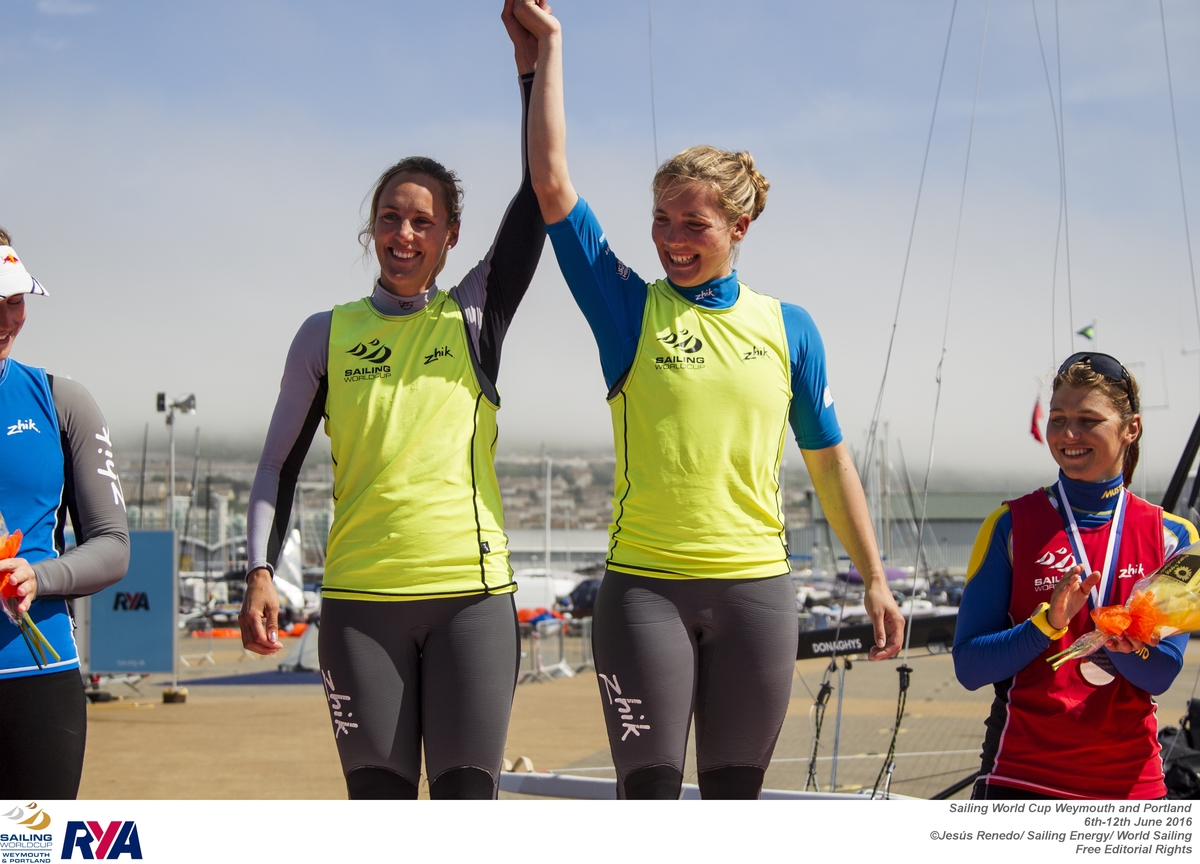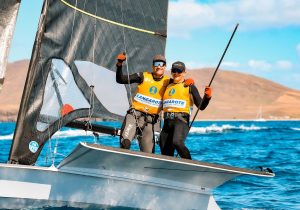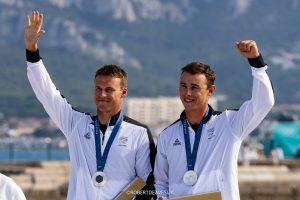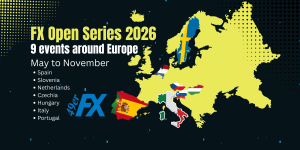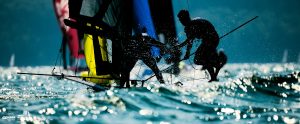Charlotte Dobson and Sophie Ainsworth (BGR) claimed their first podium finish in the past 18 months by sailing a solid medal race to 4th place thereby winning the overall standings by a single point. As they crossed the finish line they gave each other a big hug, clearly knowing the score, and knowing they had stayed clear of fast finishing Kiwi’s Alex Maloney and Molly Meech who had won the medal race.
“It’s been a while since we’ve been on a podium, and with it being so close to Rio we’re really happy to have pulled this out of the bag,” said Sophie Ainsworth. “This is the culmination of 9 months of specific work and we couldn’t be happier with where our sailing is right now,” said Charlotte Dobson.
After a week of waiting and light air racing, the medal races of 2016 Sailing World Cup Weymouth were conducted in fantastic sailing conditions. The 49erFX fleet raced in 15 knots of windspeed and a heavy fog with had enveloped the entire course area to the point that teams were sailing much of the race by feel, at times unable to see the course area and even some of their competitors. At one point on the water commentary compared the skiffs to a fleet of pirate ships emerging from the fog as they approached the leeward marks all in a tight bunch.
Dobson and Ainsworth were consistent all week while Alex and Molly from New Zealand relied on a fantastic final day and medal race to nearly steal the win. With a 2, 1, 3 on the final day of fleet racing and then a bullet in the medal race, the Kiwis will also leave this final regatta in Europe happy with how their racing is going.
It was disappointment for Sweden’s Julia Gross and Cecilia Johnsson who were pushed back to the Bronze medal finish after a ninth place finish in the medal race.
The 49er Fleet raced just before the 49erFX and the fog had not totally moved into the race area by that point. Their race was just a bit lighter in terms of windspeed but extremely tight in the middle wind ranges with flat water, as all the teams can go fast and boat handle well in moderate conditions.
Like so many other 49er regattas this quadrennial, the announcement of Kiwi winners might be no suprise. The noteworthiness in Weymouth is that it’s youngsters Logan Dunning Beck and Jack Simpson who have claimed the top prize, with stars Peter Burling and Blair Tuke off on Americ’s Cup duty in Chicago this weekend. The kiwis won the regatta with a scoring average of 5.8 points per race, a standard mark to win a 49er event prior to Burling and Tuke’s dominance over the past four years.
Finishing the regatta in second place was Olympic bound Dylan Fletcher and Alain Sign (GBR) just a two point margin ahead of squad mates John Pink and Stuart Bithell. Like the entire quadrennial, there is hardly anything between these two teams, yet the advantage lies with Fletcher and Sign, who claim the Silver medal in Weymouth and last month won the British team selection. Pink and Bithell are long time campaigners and it’s a testiment to their skillset and manner that they were able to come out this week and compete at the highest of levels after the dissapointment of being passed over last month.
The Irish team of Matt McGovern and Ryan Seaton stole much of the focus during the medal race itself. They had an incident at the start line with the Italian team, but won an on the water protest and got clear air heading to the far left side of the race track. They had blazing speed throughout the race and a comfortable lead down the final run. They went through the bottom marks for the final time and thought the race was over, like normal 49er races are, and only realized another small leg had been tacked onto the finish when it was too late and three teams passed them during the confusion.
“We’re all going to take a bit of blame for this one, helm, crew, and coach,” said Matt McGovern when asked whose responsibility navigation was on the team. “We read the sailing instructions and noted the number of laps before the start, then we discussed it as a team but we thought there was only a left hand finish option, not a right hand finish option, so when we rounded the leeward marks we headed that way,” said Matt.
The Olympic fleets now look toward Rio, first up with the South American’s, July 11-14th and then to the games themselves.

